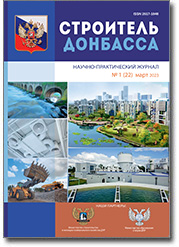Research of the urban wastewater purification’s effeciency in bioponds
Annotation: The article is researching the efficiency of post-treatment condition in urban wastewater in biological ponds with natural aeration. Our research based on the example of bioponds of the treatment plant in Dobropolye city. As a result of the research, a high efficiency of wastewater treatment for suspended solids (73%) and BOD (86%), a significant efficiency for nitrates (51%) and a low one for phosphates (24%) were established. In addition, an increase in the concentration of ammonium and nitrite in the effluents after bioponds was revealed, due to the processes of assimilation and incomplete dissimilation denitrification, respectively. As a result of comparing the quality of wastewater treatment in 2016 and 2021. It was found that without periodic measures to clean the bioponds, their efficiency gradually decreases. The existing methods of intensification of wastewater treatment in bioponds are considered and it is determined that the most rational way is the cultivation of higher aquatic vegetation in reservoirs, provided that it is removed and disposed of in a time periodic manner.
Keywords: wastewater, biological ponds, post-treatment, efficiency, suspended solids, BOD, ammonium, nitrites, nitrates, phosphates.
Pages: 16-23.
For citation:
For citation: Markin, V. V.; Markin, V. A. Research of the urban wastewater purification’s effeciency in bioponds. – Text : direct. – In: <em>The Builder of Donbass</em>. – 2023. – Issue 1-2023. – Р. 16-23. – ISSN 2617-1848.

Issue 1-2023
Journal: The Builder of Donbass
Publish house: Donbas National Academy of Civil Engineering and Architecture
Journal: The Builder of Donbass
Publish house: Donbas National Academy of Civil Engineering and Architecture
